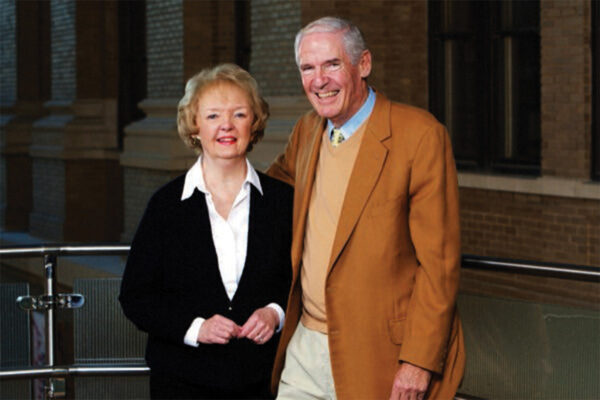

Charles Field “Chuck” Knight earned his undergraduate degree from Cornell University in 1957, his BME in 1958, and his Johnson MBA in 1959. The Knight family legacy at Cornell continues with his son Lester Knight III (BS engineering 1980, MBA 1981), and three grandchildren: Jessica Knight (A&S, class of 2007); Charles “Chase” Knight (Dyson, class of 2009), and Phyllis Knight (A&S, class of 2017).
As a teenager, Mr. Knight grew to understand the value of hard work and independence. His father, Lester B. Knight Jr., ‘29, insisted he take on the “hardest work possible.” These experiences gave him “the confidence to do anything.” At Cornell, he played varsity football and tennis, and he coached freshman football and taught classes at the Hotel School (Nolan) and College of Engineering while earning his MBE and MBA. Mr. Knight began his career as a management consultant in his father’s firm, Lester B. Knight & Associates Inc. in Chicago. He married his high school sweetheart, Joanne Parrish, in 1957, and they have four children.
In 1973, Mr. Knight was named CEO of Emerson Electric Company – the youngest person, at 37, to lead a billion-dollar public company. During his 27-years as CEO, Emerson achieved an unprecedented 43 consecutive years of earnings growth, and 44 years of consistent dividend growth. When he retired in 2000—remaining as chairman until 2004—he had helped transform Emerson from a domestic manufacturer of motorized electrical products to a global technology giant. Widely recognized for his business acumen and drive to be the best, he was fiercely committed to market leadership, and his strategies ultimately helped secure Emerson’s position among global powerhouses. There are few other industrial CEOs, if any, who managed so much change with such consistent success. Mr. Knight wrote of his experiences in the book, Performance Without Compromise, published in 2005 by the Harvard Business School Press. His legacy has carried forward; at the time of his death in September 2017, Emerson was ranked 139 among the Fortune 500, with 74,000 employees worldwide.
Mr. Knight loved the city of St. Louis, where Emerson is headquartered, and was engaged in a number of organizations. A longtime trustee of Washington University, he taught a popular MBA class at the Olin School of Business after his retirement. In his philanthropy, his intention was to make a lasting impact. In St. Louis, there are numerous entities that bear witness to his support, including the Charles F. Knight Emergency and Trauma Center at Barnes Jewish Hospital, Washington University’s Charles F. Knight Executive Education Center, and the Charles F. and Joanne Knight Alzheimer’s Disease Research Center at the university’s medical school.
He maintained his connection to Cornell throughout his lifetime, serving on the Engineering and Johnson Advisory Councils, and as a guest lecturer in Professor Hal Bierman’s “Cases in Finance” class. In 1996, he was honored as the Robert S. Hatfield Fellow in Economic Education. At Cornell, his significant philanthropic investments extend to engineering, including the Charles F. Knight ’57 Nanoscience Laboratories in Duffield Hall, business, science, and athletics. Most recently, his family perpetuated his generosity to Cornell by endowing the deanship of the SC Johnson College: Andrew Karolyi is the inaugural Charles Field Knight Dean of the Cornell SC Johnson College of Business.
THE KNIGHT FAMILY’S RESPONSES TO ENGAGEMENT AND ADVICE QUESTIONS:
1. What is it about Johnson that inspired Chuck to stay engaged?
The legendary Harold “Hal” Bierman was among a handful of early faculty who developed the culture and character of the school. He was deeply engaged with his students, serving as far more than a teacher—he was a mentor and friend to many, including Chuck. It was Hal who inspired Chuck to come back to campus from time to time to teach in his class, and it was Chuck who spearheaded the fundraising campaign to endow a distinguished professorship in Hal’s honor.
2. What’s your advice for current students, who will soon be global business leaders?
Chuck believed that you should always be well-prepared and was notorious for his lack of patience with those who were not. He was driven by a desire to be the best, and he would strongly encourage aspiring business leaders to work hard, be competitive, but always make time for family, which was truly Chuck’s greatest joy.
